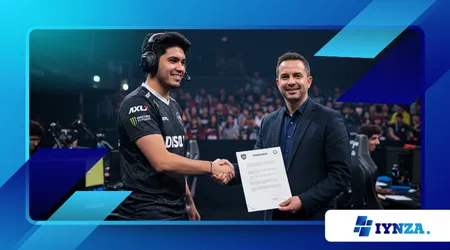How to Get Sponsored as an Esports Player in 2025

Getting sponsored as an esports player is not just about being highly skilled—it requires branding, engagement, networking, and a strategic approach to attracting sponsors.
Anúncios
The esports industry is growing at an unprecedented rate, with sponsorships playing a key role in the success of professional and aspiring players.
In 2025, as brands continue investing in competitive gaming, securing sponsorships has become more competitive than ever.
This guide will explore how to get sponsored as an esports player, covering essential strategies such as building a personal brand, engaging with audiences, networking with organizations, and pitching to potential sponsors.
Why Sponsorships Matter in Esports
Sponsorships are one of the main revenue streams for esports players. Unlike traditional sports, where salaries and prize money dominate earnings, many esports professionals rely on brand partnerships to sustain and grow their careers.
Benefits of Esports Sponsorships:
- Financial Support – Covers travel expenses, gaming equipment, and tournament fees.
- Brand Exposure – Enhances visibility in the gaming community and beyond.
- Networking Opportunities – Connects players with teams, organizations, and other professionals in the industry.
- Stability & Growth – Enables long-term career development in esports.
Understanding what sponsors look for in a player is crucial to securing lucrative deals and standing out in a crowded market.
1. Build a Strong Personal Brand
Esports sponsorships are not just about performance—brands seek players who can represent their image, engage with audiences, and create valuable content. Having a strong personal brand makes you more attractive to sponsors.
How to Build Your Brand as an Esports Player:
- Develop a Unique Identity – Choose a gaming name, logo, and visual style that reflects your personality.
- Be Active on Social Media – Platforms like Twitch, YouTube, Twitter, and TikTok are essential for growing an audience.
- Create Engaging Content – Stream regularly, post highlights, and interact with your followers.
- Maintain Professionalism – Sponsors prefer players who are responsible, marketable, and brand-friendly.
Having a recognizable brand increases your value as a content creator and competitor, making sponsors more likely to invest in you.
Read also: The Latest in Gaming Tech: From Consoles to Cloud Gaming
2. Grow Your Audience and Engagement
Sponsors want reach and engagement—the larger and more interactive your audience, the more attractive you are. Even if you are not a top-tier player, a loyal fan base can make you a valuable sponsorship asset.
Tips for Growing Your Audience:
- Stream Consistently – Establish a streaming schedule on platforms like Twitch and YouTube Gaming.
- Engage with Followers – Respond to comments, host Q&A sessions, and play games with your fans.
- Collaborate with Other Players – Cross-promotions with fellow gamers can expand your audience reach.
- Leverage Short-Form Content – Use Instagram Reels, and YouTube Shorts to share highlights and viral clips.
A high engagement rate is often more valuable than just having large follower numbers. Sponsors prioritize quality interactions over passive audiences.
3. Network with Teams, Brands, and Industry Professionals
Many sponsorship opportunities come from industry connections rather than just skill level. Engaging with teams, brands, and tournament organizers can lead to deals that might not be publicly advertised.
How to Network Effectively:
- Attend Gaming Events & Tournaments – Online or in-person events provide opportunities to meet sponsors.
- Join Esports Organizations & Discord Communities – Many sponsorships are secured through gaming networks and esports groups.
- Engage with Brands on Social Media – Tag brands when using their products and build relationships with company representatives.
- Connect with Team Managers & Agents – Many esports teams help players find sponsorships.
Having a strong network increases the chances of being noticed by potential sponsors, making it easier to land deals.
4. Approach Sponsors with a Professional Pitch
Once you have a strong brand, audience, and industry connections, the next step is pitching yourself to sponsors. A well-crafted proposal can set you apart from other esports players.
How to Craft a Winning Sponsorship Pitch:
- Research the Brand – Understand what the company values and tailor your pitch to their interests.
- Highlight Your Strengths – Emphasize your gaming achievements, social media stats, and engagement metrics.
- Show Your Value – Explain how you can promote the brand, whether through streaming, tournaments, or content creation.
- Include a Media Kit – Prepare a one-page document with your bio, audience demographics, and sponsorship benefits.
- Follow Up Professionally – If you don’t receive an immediate response, follow up in a polite and professional manner.
Sponsorships are business deals, and presenting yourself as a serious and marketable player increases your chances of success.
5. Leverage Affiliate Programs and Brand Partnerships
If direct sponsorships seem out of reach at first, consider joining affiliate programs and brand ambassador opportunities. Many gaming companies offer affiliate deals where players earn commissions from product promotions.
Examples of Gaming Affiliate Programs:
- Gaming hardware brands (Razer, SteelSeries, Logitech)
- Energy drink companies (G Fuel, Red Bull, Monster)
- Streaming platforms & software (Streamlabs, Elgato, Discord)
Affiliate programs help build relationships with brands, increasing your chances of securing full sponsorship deals in the future.
6. Stay Consistent and Adapt to Industry Trends
The esports industry evolves rapidly, and sponsored players must adapt to new trends and opportunities.
How to Stay Relevant in the Esports Industry:
- Keep up with new games and tournaments – Sponsors often focus on trending titles.
- Engage with emerging platforms – Stay active on platforms like Kick, YouTube Shorts, and TikTok.
- Rebrand when necessary – Adjust your content and branding strategy to align with industry shifts.
Consistency in content creation, tournament participation, and audience engagement is key to long-term sponsorship success.
Turning Your Passion for Gaming into Sponsorships
Getting sponsored as an esports player in 2025 requires more than just being skilled in a game. Brands seek players who can represent them effectively, engage audiences, and create valuable content.
By building a strong personal brand, networking with the right people, engaging with fans, and pitching to sponsors professionally, any dedicated player can attract sponsorships and grow their esports career.
The industry is evolving, and those who adapt, stay consistent, and provide real value to brands will stand out in the competitive esports landscape.
FAQ: Frequently Asked Questions About Esports Sponsorships
1. Do I need to be a pro player to get sponsored?
No. Many brands sponsor streamers, influencers, and content creators who have engaged audiences, even if they aren’t professional competitors.
2. How many followers do I need to get an esports sponsorship?
There’s no set number, but high engagement is more important than follower count. Even micro-influencers (5k–50k followers) can secure deals.
3. What is the best social media platform for esports sponsorships?
Twitch, YouTube, and Twitter are the most effective platforms for gaming sponsorships, but TikTok and Instagram are also valuable for short-form content.
4. Do esports sponsors pay players?
Yes. Some offer monthly payments, while others provide free products, affiliate commissions, or travel support.
5. How can I make my sponsorship pitch stand out?
Highlight your brand, engagement rates, and unique value. Providing a professional media kit improves your chances of success.
